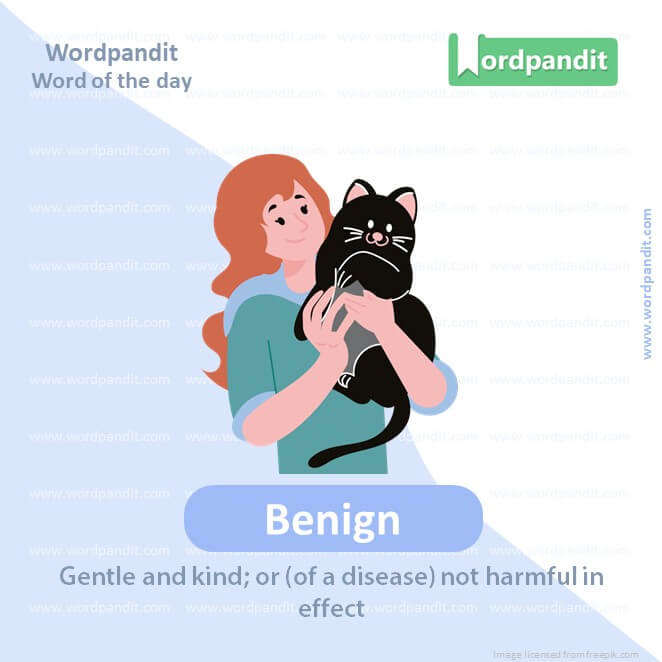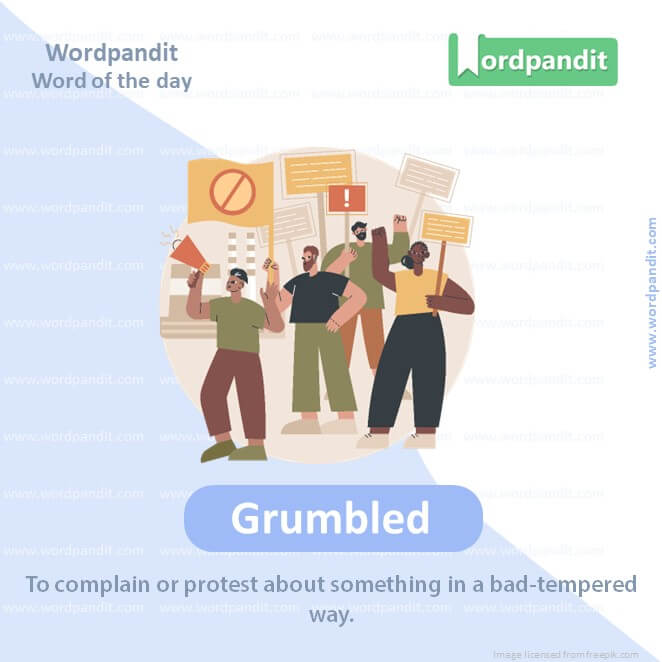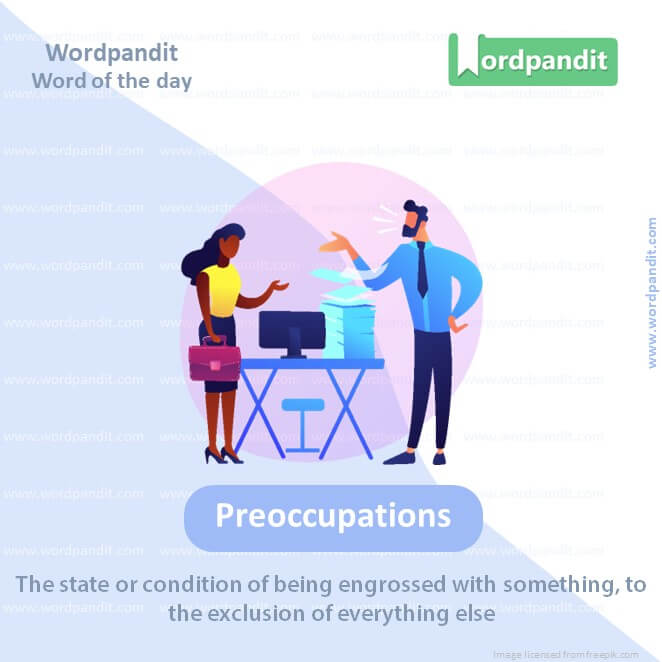Daily Vocabulary Words: List of Daily Used Words in Leading International Newspapers
Hi there. Welcome to this special section @ Wordpandit.
Our endeavour here is very simple: to highlight important daily vocabulary words, which you would come across in leading newspapers in the country. We have included the following newspapers in our selection:
• The New York Times
• The Washington Post
• Scientific American
• BBC
• The Guardian
• Psychology Today
• Wall Street Journal
• The Economist
We are putting in extensive work for developing your vocabulary. All you have got to do is be regular with this section and check out this post on a daily basis. This is your repository of words that are commonly used and essentially, we are posting a list of daily used words. Hence, this has significant practical application as it teaches you words that are used commonly in leading publications mentioned above.
Visit the website daily to learn words from leading international newspapers.

WORD-1: GILDED
CONTEXT: “Amid the city’s gilded skyline, wealth inequality remained a pressing issue, with stark disparities between the affluent and the marginalized.”
SOURCE: The Economist
EXPLANATORY PARAGRAPH: Imagine if you had a toy car and you painted it with a shiny gold color on top. Now, it looks like it’s made of gold, even if it’s not. When something is “gilded”, it means it’s covered in a thin layer of gold or it just looks fancy and shiny.
MEANING: Covered with a thin layer of gold or a substance that looks like gold (adjective).
PRONUNCIATION: Gill-ded.
SYNONYMS: Gold-coated, gold-plated, glittering, shiny, lustrous, glinting, golden.
USAGE EXAMPLE:
1. The gilded frame made the painting look even more expensive.
2. She wore a gilded necklace to the party.
3. The gilded statues were the highlight of the museum.
4. Many ancient temples have gilded domes.
WORD-2: COHERENT
CONTEXT: “The professor’s lecture was remarkably coherent, presenting complex theories in a way that even the non-experts in the room could understand.”
SOURCE: Scientific American
EXPLANATORY PARAGRAPH: Imagine if you had a puzzle and all the pieces fit together perfectly without any gaps. That’s like something being “coherent”. It means everything makes sense and is clear.
MEANING: Logical and consistent; clear and easy to understand (adjective).
PRONUNCIATION: Koh-heer-ent.
SYNONYMS: Logical, consistent, clear, understandable, lucid, comprehensible, connected.
USAGE EXAMPLE:
1. His speech was coherent and everyone understood his message.
2. For a solution to be accepted, it needs to be coherent.
3. The teacher asked for a coherent explanation.
4. The story was coherent and had no plot holes.
WORD-3: DEPORTED
CONTEXT: “Immigration policies came under scrutiny as more families were deported, raising questions about the human rights implications of such actions.”
SOURCE: The Guardian
EXPLANATORY PARAGRAPH: Imagine if someone was told they can’t stay in a place and they have to go back to where they came from. When someone is “deported”, it means they are sent back to their home country by the government.
MEANING: To send someone back to their home country, usually because they did not follow some rules (verb).
PRONUNCIATION: Dee-por-ted.
SYNONYMS: Expelled, banished, evicted, ousted, exiled, ejected, sent back.
USAGE EXAMPLE:
1. He was deported for not having the right visa.
2. The government deported several people last week.
3. If rules are not followed, one can be deported.
4. Being deported can be a challenging experience for many.

WORD-4: BENIGN
CONTEXT: “The recent medical report confirmed that the tumor was benign, bringing relief to the patient and their family.”
SOURCE: The New York Times
EXPLANATORY PARAGRAPH: Think of a really kind and gentle teacher or a harmless puppy. When something or someone is “benign”, it means they are gentle, not harmful, or kind.
MEANING: Gentle and kind; or (of a disease) not harmful in effect (adjective).
PRONUNCIATION: Bee-nine.
SYNONYMS: Gentle, harmless, kind, mild, non-threatening, friendly, benevolent.
USAGE EXAMPLE:
1. The doctor confirmed the tumor was benign.
2. Her benign smile put everyone at ease.
3. They found the old man to be benign and friendly.
4. The benign weather made for a perfect picnic day.
WORD-5: GAZE
CONTEXT: “As world leaders gathered for the summit, their gaze turned to the pressing issues of climate change and global cooperation.”
SOURCE: BBC
EXPLANATORY PARAGRAPH: Imagine you see a beautiful butterfly and you can’t stop looking at it. When you “gaze” at something, it means you look at it for a long time, usually because it’s interesting or beautiful.
MEANING: To look steadily and intently at something, especially in admiration or surprise (verb).
PRONUNCIATION: Gayz.
SYNONYMS: Stare, glance, peer, observe, watch, behold, view.
USAGE EXAMPLE:
1. She gazed at the stars all night.
2. The child gazed in wonder at the magician.
3. I could gaze at the ocean for hours.
4. He gazed into the distance, lost in thought.

WORD-6: GRUMBLED
CONTEXT: Despite the economic growth, some citizens grumbled about rising living costs, highlighting the challenges of ensuring prosperity for all.
SOURCE: The Washington Post
EXPLANATORY PARAGRAPH: Imagine if you wanted ice cream, but you got vegetables instead, and you said, “Oh, I wanted ice cream.” That’s “grumbling”. It means to complain about something in a quiet way.
MEANING: To complain or protest about something in a bad-tempered way (verb).
PRONUNCIATION: Grum-buld.
SYNONYMS: Complain, mutter, murmur, grouse, whine, moan, protest.
USAGE EXAMPLE:
1. He grumbled about the cold weather.
2. She grumbled under her breath when she didn’t get the toy.
3. They grumbled about the delay in the flight.
4. Even though he grumbled, he eventually did the work.

WORD-7: PREOCCUPATIONS
CONTEXT: The survey revealed the preoccupations of the younger generation, with climate change and job security ranking high on their list of concerns.
SOURCE: Al Jazeera
EXPLANATORY PARAGRAPH: Imagine if you really love drawing and you think about it all the time, even when you’re doing other things. That drawing is your “preoccupation”. It’s something that takes up a lot of your thoughts or time.
MEANING: The state or condition of being engrossed with something, to the exclusion of everything else (noun).
PRONUNCIATION: Pree-oh-kyoo-pay-shuns.
SYNONYMS: Concerns, obsessions, interests, distractions, passions, fixations, focuses.
USAGE EXAMPLE:
1. Her preoccupation with music led her to become a great singer.
2. His main preoccupation was ensuring his family was safe.
3. The child’s preoccupation with dinosaurs was evident in his room.
4. Amidst all the chaos, her preoccupation was her upcoming exam.
WORD-8: ENDURING
CONTEXT: The monument stood as an enduring symbol of the nation’s history, reminding all who visited of its rich and complex past.
SOURCE: The New York Times
EXPLANATORY PARAGRAPH: Imagine if you have a toy that you’ve played with for years, and it’s still in good shape. That toy is “enduring” because it lasts for a long time without breaking or getting damaged.
MEANING: Lasting for a long time; able to withstand hardship (adjective).
PRONUNCIATION: En-dure-ing.
SYNONYMS: Lasting, persistent, permanent, continual, unending, long-lasting, steadfast.
USAGE EXAMPLE:
1. Their enduring friendship lasted decades.
2. The monument is a symbol of enduring love.
3. She admired the tree’s enduring strength against the storm.
4. Enduring success requires hard work and patience.

WORD-9: LEITMOTIF
CONTEXT: Throughout the campaign, the candidate’s commitment to social justice remained a leitmotif, resonating with voters across the political spectrum.
SOURCE: The Guardian
EXPLANATORY PARAGRAPH: Imagine if in a movie, every time a hero appears, you hear the same music playing in the background. That special music for the hero is called a “leitmotif”. It’s like a theme song for a particular character or idea.
MEANING: A recurrent theme throughout a musical or literary composition, associated with a particular person, idea, or situation (noun).
PRONUNCIATION: Lyte-moh-teef.
SYNONYMS: Theme, recurring theme, motif, signature tune, refrain, musical phrase.
USAGE EXAMPLE:
1. The leitmotif for the villain was dark and menacing.
2. Every time the love story was mentioned, the same leitmotif played in the background.
3. The composer used a leitmotif to represent hope in the movie.
4. The haunting leitmotif stayed with the audience long after the performance ended.
WORD-10: SCRUTINY
CONTEXT: The controversial decision by the government faced intense scrutiny from legal experts and human rights organizations.
SOURCE: The Washington Post
EXPLANATORY PARAGRAPH: Imagine you’re looking really closely at a puzzle piece to see where it fits. That close looking is called “scrutiny”. It means to examine or look at something really carefully.
MEANING: Close and careful examination or observation (noun).
PRONUNCIATION: Skroo-tin-ee.
SYNONYMS: Examination, inspection, analysis, study, probe, investigation, review.
USAGE EXAMPLE:
1. The teacher’s work came under scrutiny by the principal.
2. Every detail of the plan was subjected to strict scrutiny.
3. The mystery was solved after days of scrutiny.
4. She felt uncomfortable under the scrutiny of the interviewer.
Vocabulary Daily Words
Embracing novel terms into your lexicon can be a highly edifying and immersive experience. Key to this journey is the acquisition of vocabulary daily words. But how should we effectively incorporate vocabulary daily words into our language command? Let’s examine some successful strategies.
The first step to learn vocabulary daily words is to engage in avid reading and active listening. Exploring diverse genres of literature or reputable news sources allows encounters with vocabulary daily words. Be it a conversation, a podcast, or a riveting novel, these experiences offer a myriad of vocabulary daily words and the chance to understand their usage.
Next, having a vocabulary journal dedicated to vocabulary daily words can be incredibly beneficial. Recording these words, along with their meanings, synonyms, antonyms, and an example sentence, can solidify your understanding. Regular review of this vocabulary journal will strengthen your memory association, especially with vocabulary daily words.
Another potent method comes with aphorisms like “practice makes perfect”. Regularly incorporate vocabulary daily words in your daily conversations, writings, or social media posts. This consistent usage helps to assimilate vocabulary daily words into your active language base, ensuring they aren’t easily forgotten.
Visual learners may find it useful to associate vocabulary daily words with images or colors. For instance, flashcards can be color-coded based on the degree of familiarity with the words. This visual connection aids in recalling the meanings of vocabulary daily words effectively.
Lastly, cultivating a passion for word origins, etymology, or related phrases can heighten engagement and assist with the retention of vocabulary daily words. This intrigue makes learning a fulfilling endeavor.
In summary, effectively learning vocabulary daily words rests upon reading and listening, maintaining a vocabulary journal, consistent application, using visual tools, and nurturing an interest in words and language. When used in tandem, these strategies streamline the process of learning vocabulary daily words, thus enriching your linguistic prowess.









